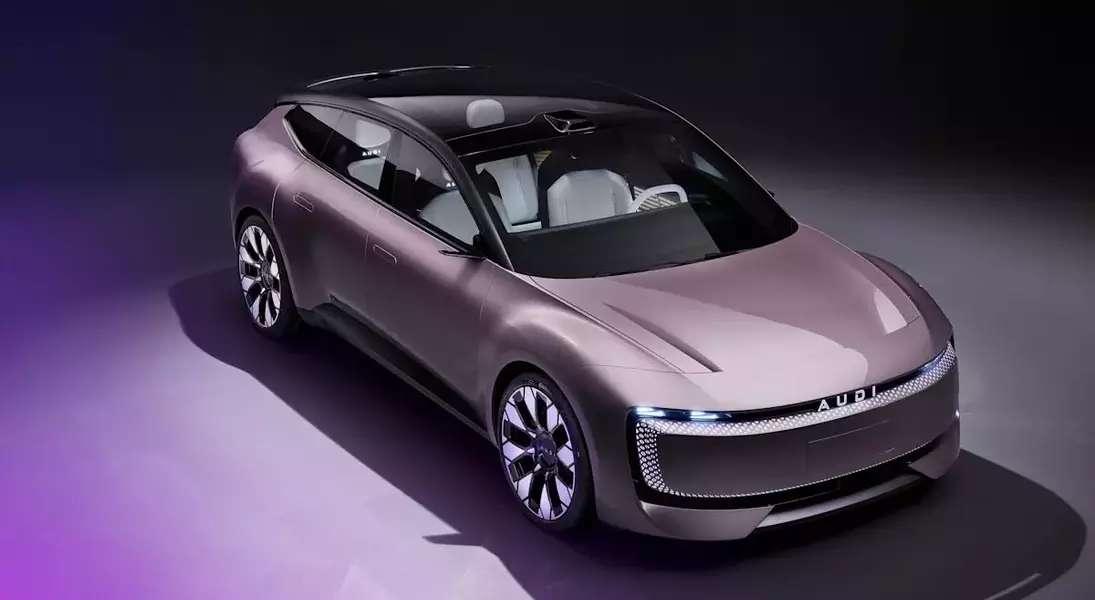Audacious plans are underway as Audi prepares to launch its first China-exclusive fully electric vehicle, set to make its debut at the prestigious Shanghai auto show on April 23. Under the leadership of CEO Gernot Döllner, this groundbreaking model will not only mark a new chapter for Audi but also signal a strategic shift in branding and market positioning. The EV will be unveiled under a refreshed brand identity, one that departs from Audi’s iconic four-ring emblem. This initiative aims to captivate a younger demographic with a penchant for cutting-edge technology.
Unveiling Tomorrow’s Mobility Solutions Today
The automotive industry is witnessing a seismic shift towards sustainable transportation, and Audi is poised to lead this transformation in China. With the introduction of a dedicated electric vehicle lineup tailored specifically for the Chinese market, Audi seeks to rekindle its appeal among discerning consumers. By leveraging partnerships with local entities such as SAIC, Audi aims to deliver vehicles that resonate with tech-savvy buyers while addressing the challenges posed by fierce domestic competition.Pioneering a Fresh Identity
Audi's decision to introduce a distinct brand identity for its China-exclusive models reflects a deeper understanding of evolving consumer preferences. This strategic move was previewed last year through the unveiling of the Audi E crossover concept, which hinted at a bold design language and innovative features. Targeting young professionals who value advanced technology and sleek aesthetics, the new brand promises to redefine expectations within the premium electric segment.In an era where customization and personalization dominate purchasing decisions, Audi recognizes the importance of aligning its offerings with these trends. The first model under this new identity will hit the market mere months after its Shanghai debut, accompanied by two additional variants over the subsequent three years. Although specifics regarding the initial model's competitive positioning remain undisclosed, the November-revealed concept showcased a dynamic Sportback crossover measuring 4,870 mm in length, suggesting a focus on sporty elegance combined with practicality.Adapting to Market Realities
Facing declining sales figures in its largest market—down 11% to 653,016 units last year—Audi acknowledges the need for reinvention. Intense rivalry from both global brands and aggressive pricing strategies employed by local competitors have significantly impacted customer spending patterns. To counteract these challenges, Audi has forged a collaborative relationship with SAIC, building upon an alliance established in 2021. This partnership extends beyond mere production capabilities; it involves integrating SAIC's technological advancements into Audi's product development processes.Moreover, Audi maintains a longstanding collaboration with FAW Group in China, ensuring a robust dual-partnership structure. Notably, SAIC currently manufactures several exclusive-to-China models, including the A7L, Q6 Roadjet SUV (combustion engine variants), and the Q5 E-tron electric SUV. Such localized production efforts underscore Audi's commitment to delivering tailored solutions that meet regional demands.Accelerating E-Mobility Adoption
As e-mobility continues to gain momentum globally, China stands out as a trailblazer in this domain. Remarkably, new-energy vehicles, encompassing both battery-electric and plug-in hybrid options, accounted for nearly half of the Chinese market share in 2024. Recognizing this trend, Audi has accelerated its electrification roadmap, planning to roll out the A6 E-tron sedan and Q6 E-tron SUV later this year. These models will leverage the newly localized Premium Platform Electric architecture, marking a significant milestone in Audi's manufacturing capabilities within China.Underpinning this rapid progression is Audi's ability to learn from its experiences collaborating with Chinese partners. According to CEO Gernot Döllner, insights gained from these interactions have translated into enhanced efficiency across all operations. In Europe, for instance, project timelines have seen remarkable improvements, with delays shrinking to just a few months compared to previous cycles. This heightened agility positions Audi favorably to compete effectively in an increasingly fast-paced global landscape.Fostering Innovation Through Synergy
Collaboration lies at the heart of Audi's renewed strategy, enabling the brand to harness diverse expertise and resources. By fostering synergies between its European headquarters and Chinese counterparts, Audi achieves optimal alignment between research, development, and production phases. This integrated approach ensures that innovations conceived in China can seamlessly integrate into broader product portfolios, benefiting customers worldwide.Furthermore, Audi's emphasis on speed and adaptability resonates strongly with contemporary market dynamics. As consumer expectations evolve rapidly, manufacturers must respond accordingly to remain relevant. By streamlining processes and embracing cross-border cooperation, Audi demonstrates its readiness to embrace change and drive progress in the automotive sector.
